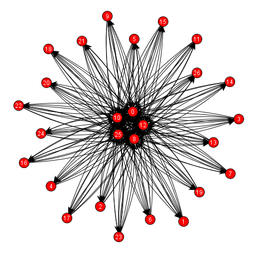Spatial Mobility in the Formation of Agent-Based Economic Networks
- Started
- 1st September 2010
- Ended
- 1st January 2011
- Research Team
- Camillia Zedan
- Investigators
- Antonella Ianni, Seth Bullock
We extend the model of spatial social network formation of Johnson and Gilles (Review of Economic Design, 2000, 5, 273-299) by situating each economic agent within one of a set of discrete spatial locations and allowing agents to maximise the utility that they gain from their direct and indirect social contacts by relocating in addition to forming or breaking social links. This enables the exploration of scenarios in which agents are able to alter the distance between themselves and other agents at some cost. Agents in this model might represent countries, firms or individuals, with the distance between a pair of agents representing geographical, social or individual differences, and the network of social relationships characterising some form of self-organised persistent interaction such as trade agreements or friendship patterns. By varying the distance-dependent costs of relocation and maintaining social relationships we are able to identify conditions that promote the formation of spatial organisations and network configurations that are pairwise stable and efficient. We also examine the associated patterns in individual and aggregate agent behaviour. We find that both relative location and the order in which an agent is allowed to act can drastically affect individual utility. These traits are found to be robust to random perturbations.
Categories
Socio-technological System simulation: Economic Networks, Human environment interaction, Human population, Social and Socio-economic Systems, Social Networks
Algorithms and computational methods: Agents, Boundary elements, Game Theory
Visualisation and data handling software: Jung
Software Engineering Tools: Eclipse
Programming languages and libraries: Java
Computational platforms: Windows
Transdisciplinary tags: Complex Systems, Computer Science
